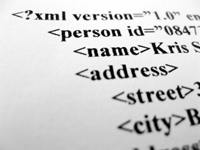Web Development Technologies
The following is a guide to some of the main web technologies we use to develop accessible, W3C standards-compliant web sites. Please contact us to discuss your specific needs.
Client-Side Technologies
- XHTML
- XHTML is a markup language designed to structure information for presentation as web pages. Rather than relying on WYSIWYG programs, we write all our XHTML by hand, ensuring that it is clean, valid and of the highest standard. This means that pages have fastest download times possible, are viewable on all browsers, are search engine friendly, and have maximum forward compatibility.
- Cascading Style Sheets
- Cascading Style Sheets control how web pages are displayed in the browser, and allow the separation of presentation from structure and content. CSS help ensure that web pages are presented in an accessible way to all visitors, over a wide range of media.
- JavaScript/ECMA Script
- JavaScript is a lightweight scripting technology which is used alongside XHTML documents to make websites more interactive.
Server-Side Technologies
- PHP
- PHP is a fast, server-side scripting language that is used to create interactive, dynamic web sites. It is particularly well-suited to integrating with a range of databases.
- CGI/Perl
- Perl is a programming language that can handle input and output from a Web Server, usually through the Common Gateway Interface. It is most commonly used to process information through forms.
- XML/XSL
- XML is a software and hardware independent markup language designed for describing and transmitting information. It is set to become the most common tool for all data manipulation and data transmission. XSL is a language for defining, transforming and formatting XML documents.
- MySQL
- MySQL is a fast, open-source Relational Database Management System that uses the popular Structured Query Language (SQL). It is perfect for most websites that need database functionality, and works hand-in-hand with PHP.
- PostgreSQL
- PostgreSQL is a more sophisticated open-source Relational Database Management System. It is well-suited to sites that require robust database functionality, such as e-commerce sites.
- Linux/Apache
- Linux is a popular open-source operating system, and Apache is the most widely-used web server on the Internet. Together they provide a fast, extremely reliable, secure platform for web sites.
- SSL/Secure Servers
- Unlike normal web servers, secure servers ensure that information exchanged between the visitor and the web site cannot be viewed by any third parties. A secure server is essential when handling confidential information, such as online credit card transactions or personal medical details. SSL, or Secure Socket Layer, is one method of exchanging data securely.
Multimedia
- Macromedia Flash
- Flash is a product designed to provide web sites with animation, sound, interactivity and database integration. A free plugin, which also ships with the major web browsers, is needed to see the Flash parts of a site. Flash can create a truly multimedia web site, but has certain disadvantages, and is therefore best used sparingly.
We also have experience with a range of other technologies, including ASP, Microsoft Access, SQL Server, Windows, IIS, SSI and Macromedia Shockwave/Director.
If you require any specialised services that we feel are outside our capabilities, then we will be happy to arrange and supervise suitably qualified contractors. Please contact us to discuss your specific needs.
|


